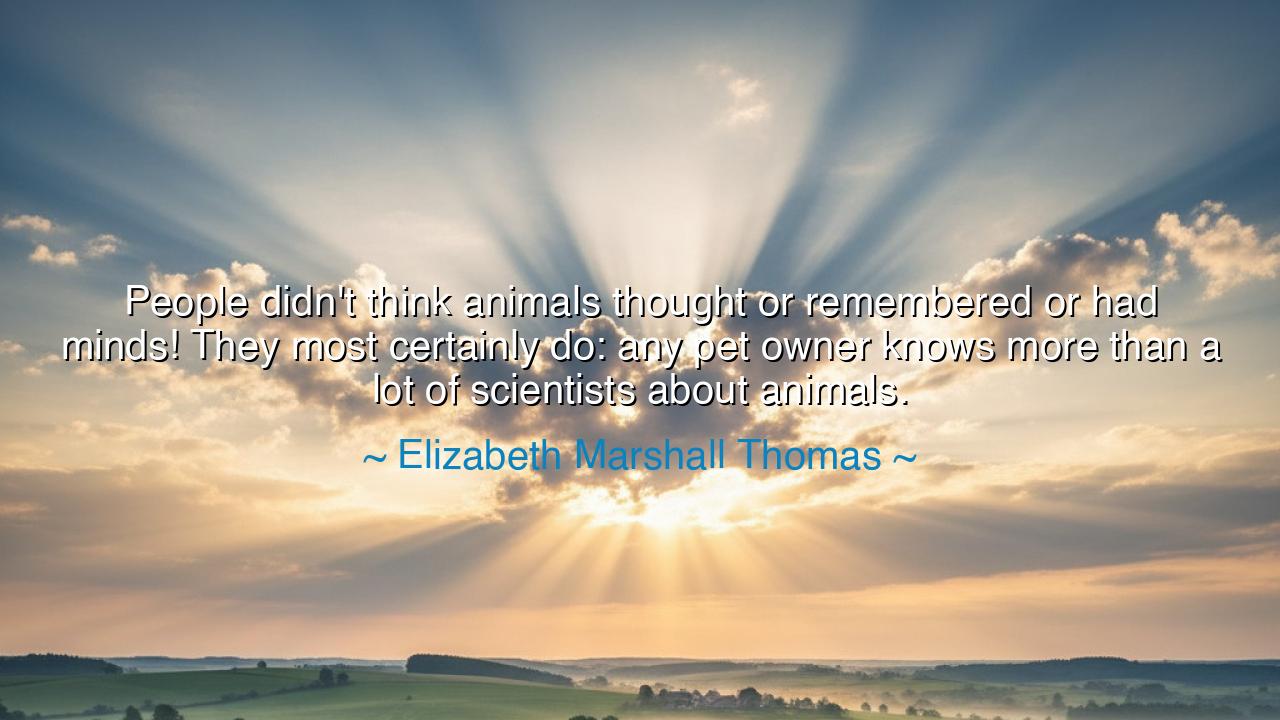
People didn't think animals thought or remembered or had minds!
People didn't think animals thought or remembered or had minds! They most certainly do: any pet owner knows more than a lot of scientists about animals.






Elizabeth Marshall Thomas once proclaimed with force and tenderness: “People didn’t think animals thought or remembered or had minds! They most certainly do: any pet owner knows more than a lot of scientists about animals.” In these words is both lament and revelation. For centuries, humankind has placed itself above the creatures of earth, imagining them to be mere machines of flesh, without thought, without memory, without spirit. Yet those who have lived beside them, those who have shared hearth and home with a pet, know with certainty that within those eyes burns awareness, within those hearts dwell loyalty, and within those memories linger both joy and sorrow.
The ancient world was divided in its view. The philosopher Aristotle declared that animals were driven by instinct, not reason, lesser beings meant to serve humankind. His voice shaped centuries of thought, turning hearts cold to the inner life of beasts. And yet, other voices knew differently. The Egyptians revered the cat as a guardian of mystery, the Hindus honored the cow as a symbol of abundance, and the Inuit spoke of their sled dogs as companions, kin almost human. Thus Thomas’s cry is not new, but an echo of older wisdom drowned too long beneath the march of pride.
What she names is proven daily in the quiet lives of men and women with pets. The dog who grieves at the grave of its master, refusing food in the depth of mourning; the elephant who remembers kindness across decades; the cat who returns to the call of a child years after leaving home. These are not instincts alone, but memory, thought, and mind. The pet owner knows this not through experiment or theory, but through the lived reality of love returned. Their knowledge is not written in journals, but in the wag of a tail, the nuzzle of a head, the silent vigil by the bedside.
History itself testifies. Alexander the Great wept bitterly for Bucephalus, his horse, and built a city in his honor. When Hachikō, the Japanese dog, waited for his master at the train station every day for nine years after the man’s death, the world recognized the faithfulness of an animal’s mind and memory. Such stories are not fairy tales; they are monuments to truths that the cold arrogance of science too often denied.
Elizabeth Marshall Thomas, having spent her life observing animals with the devotion of both scholar and lover, speaks from the authority of witness. She names the blindness of those who claimed animals do not think. She reveals the wisdom of ordinary people who, through their bond with pets, have always known better. To live daily with another creature, to share one’s time and affection, is to discover beyond all argument that the gulf between species is not of mind, but only of form.
The lesson is this: let us put aside arrogance and learn humility from those we call lesser. Recognize that within every creature beats a mind, though it may not speak our tongue. Honor their memories, their thoughts, their emotions, as part of the same creation that gave us our own. To deny their minds is to shrink our own; to recognize them is to expand our compassion.
Practical action is clear. If you are a pet owner, pay attention. Learn from your animal as you would from a teacher. Respect their feelings, their memories, their needs. If you are not, then look upon the creatures of the world not as objects, but as fellow travelers on the road of existence. Protect them, honor them, and never again dismiss their inner lives. For in the measure that we grant dignity to the voiceless, we reveal the dignity of our own souls.
Thus Thomas’s words, though born of modern thought, resound with the wisdom of the ancients: The beasts do not lack minds—it is we who lack the vision to see them. Let every generation remember: the bond between human and animal is not master and servant, but mind to mind, heart to heart. And in that recognition lies not only justice for them, but salvation for us.






AAdministratorAdministrator
Welcome, honored guests. Please leave a comment, we will respond soon